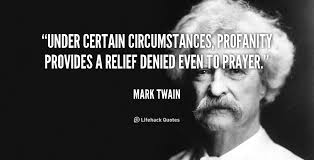
THE EAR OF THE BEHOLDER
By Dr. Nancy Irwin
Find yourself cussing and swearing more lately? You are not alone. The average American is dealing with much higher levels of frustration, anger, anxiety and depression right now. Addictive behaviors and other self-abuse are also on the rise. So if your scatology is your worst offense, you are really doing OK.
Wrike’s 2016 Workplace Management Survey found from a sample of 1,542 workers that 57% swear in the workplace, yet 41% of them felt it is unprofessional. The survey also found that 25% say that they swear daily; that more women than men admit to it (60% to 55%), but men do so at a higher frequency. 94% of these workers swear more face-to-face than via online or email; 66% state that are more likely to swear if their bosses do, and 33% would not consider working at a company where swearing is strictly forbidden.
“Blue” language can actually be a virtually harmless coping mechanism…as long as you know your audience and respect them. Venting with a few spicy words here and there, in a safe setting, can actually be very freeing for you. After all, words really only the have the power we give them, and most four-letter words are derived from acronyms (e.g., Ship High in Transit was a mariner’s manure cargo label) and from dialectical origins. As well, when we over-use certain words, they lose their power.
In addition to being a fairly socially acceptable stress reliever, swearing can be cultural, attention-getting, rebellious, or sexual. It can be driven by passion, amazement, outrage, and of course, anger. Vocal tone, body language, and the energy behind the words are more telling about one’s attitude and intent than the actual words. We exclaim with “colorful words” on such joyous occasions as flying down a roller coaster, beholding a natural wonder, or watching a grand slam. When anger is predominantly driving your swearing, then it can actually increase your anger and anxiety. With repetition, it reinforces the grooves in the neuronal pathways, and causes your anger, literally, to deepen. Of course, this means if you have a positive association to swear words, it will deepen your enjoyment of them!
When used discriminately, it can be a wonderful outlet for stress. Imagine being stuck in traffic on your way to an important job interview; getting to a concert and discovering you do not have your tickets; just finishing your dissertation and your hard drive crashes. If your commentary on these situations is fit for broadcast on CNN, then I applaud you. If you can honestly get stress relief from “Oh, blast! This is truly an undesirable situation!” congratulations, you are one of the few who can actually minimize upset, anxiety, or anger in the moment to hasten their dissipation.
Swear words generally fall into three categories: Deistic: “Oh, My God!” and the ever-popular “G—D—” expression. Or condemning someone to hell (and of course the legendary combination of the last two.) Visceral: body parts and functions (pleasant or un-). Interesting how we denigrate our most life-affirming act and favorite body parts, huh? Not to mention the incestual suggestion in the ever popular “MoFo”! Sometimes we combine the deistic and the visceral (Holy S—!) Racial. I won’t even dignify these with abbreviations, for personally, I find these the most profane of all.
So, if you enjoy making truck drivers blush, knock yourself out. If you are out of control – – can’t choose cleaner words around children, those whom you know it offends, in a business meeting, or on the air – – then you might want to seek help for impulse control or anger management. Start reading fine literature and expanding your language skills. Vocabularies limited to the lower levels offend some people more than others. Again, just know your audience. It’s all in the ear of the beholder. We all have boundaries to be respected: physical, sexual, ethical, visual, olfactory, tactile, and auditory.
If you think I’m defending swearing here, well, hell, you are garl-durn abso-fricking-lutely right!

